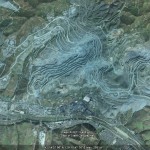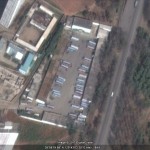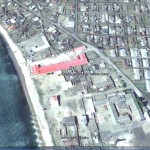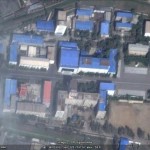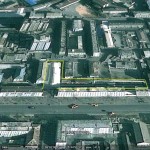Pictured above (Google Earth): The Musan Mine, the DPRK’s largest. See in Google Maps here.
According to the JoongAng Daily:
During his surprise May visit to China, North Korean leader Kim Jong-il secured free fertilizer and discounted food to help alleviate the impoverished country’s chronic food shortages.
A source in Beijing who monitors North Korea-China relations told the JoongAng Ilbo on Monday that Chinese officials agreed to provide 200,000 tons of fertilizer free of charge as well as 500,000 tons of corn at a discount in exchange for rights to North Korea’s abundant natural resources.
“When 200,000 tons of fertilizer is planted on North Korean soil, it can bring about a three-fold increase in the harvest,” the source said. “This can be the equivalent of giving 600,000 tons of food.”
The source added that China agreed to sell the 500,000 tons of corn for half of the international rate, which would be $30 per ton.
The corn, the source said, had already crossed the border into North Korea from northeastern China.
In exchange, Kim will allow China access to his country’s natural resources.
“The two parties agreed to participate in the extraction of buried rare earth minerals in Musan in Hamgyong Province,” the source said. “It’s quite a profit for China as it is thirsty for materials.”
North Korea is estimated to have around 20 million tons of rare earth minerals, which are vital in the production of high-tech goods.
The Beijing-based source said the agreement gives China the responsibility for the cost of building roads to transport the natural resources as well as lending equipment.
In exchange, North Korea will hand over 50 percent of the extracted rare earth minerals free of charge to China, with the rest to be sold to China at international market rates.
Meanwhile, other sources said that Kim also received a health checkup during his stay in China.
“When Kim Jong-il was visiting Yangzhou, he received a special examination from an oriental medicine doctor that the highest Chinese elite have gone to over the years,” a source familiar with North Korean issues said
The source added: “Kim Jong-il has never trusted China’s Western medicine. I heard from a Chinese official that Kim received an oriental medicine diagnosis by taking his pulse and that it did not involve drawing blood.”
Additional Information:
1. Here is a post linking to all the major DPRK food stories this year.
2. The media has reported on other DPRK food barter deals with Cambodia and Myanmar.
3. The role of the Musan Mine in DPRK-PRC relations has been quite interesting. Here are previous posts on the mine.
Read the full story here:
North got fertilizer on Kim’s trip to China
JoongAng Daily
Chang Se-jeong
2011-8-19
